 Petzlover
Petzlover Istarski Ostrodlaki Gonic is originated from Croatia but Welsh Terrier is originated from United Kingdom. Istarski Ostrodlaki Gonic may grow 21 cm / 9 inches higher than Welsh Terrier. Istarski Ostrodlaki Gonic may weigh 17 kg / 38 pounds more than Welsh Terrier. Both Istarski Ostrodlaki Gonic and Welsh Terrier has almost same life span. Istarski Ostrodlaki Gonic may have more litter size than Welsh Terrier. Istarski Ostrodlaki Gonic requires Low Maintenance. But Welsh Terrier requires Moderate Maintenance
Istarski Ostrodlaki Gonic is originated from Croatia but Welsh Terrier is originated from United Kingdom. Istarski Ostrodlaki Gonic may grow 21 cm / 9 inches higher than Welsh Terrier. Istarski Ostrodlaki Gonic may weigh 17 kg / 38 pounds more than Welsh Terrier. Both Istarski Ostrodlaki Gonic and Welsh Terrier has almost same life span. Istarski Ostrodlaki Gonic may have more litter size than Welsh Terrier. Istarski Ostrodlaki Gonic requires Low Maintenance. But Welsh Terrier requires Moderate Maintenance
 The Istarski Ostrodlaki Gonic, also referred to as the Istrian wire-haired or short-haired scenthound is a very ancient dog breed. Apparently the dog has been found in paintings that go way back to the early 1700s.
The Istarski Ostrodlaki Gonic, also referred to as the Istrian wire-haired or short-haired scenthound is a very ancient dog breed. Apparently the dog has been found in paintings that go way back to the early 1700s.
The dog can either have a short, smooth coat or a rough, wiry longer coat. He has always been popular with hunters, used for hunting rabbits and fox.
An interesting fact with this dog is the correlation between the Dalmatian dog and the Istrian short-haired hound. According to veterinary investigations, there are strong likenesses between the two breeds.
The truth is, the origin of the Istrian has been a matter of dispute for some time but in 2003 the Federation Cynologique Internationale recognized the breed as hailing from Croatia.
 Originating in Wales and bred to hunt the Welsh Terrier might be the oldest dog breed from the U.K. still in existence today. They were bred to hunt badgers, rodents, and fox. Today however they are mostly bred for show and companionship.
Originating in Wales and bred to hunt the Welsh Terrier might be the oldest dog breed from the U.K. still in existence today. They were bred to hunt badgers, rodents, and fox. Today however they are mostly bred for show and companionship.
There are only two breeds of terrier that are native to the country of Wales, the Welsh and the Black and Tan Rough Terrier. It is believed that the Welsh Terrier was descended from that Black and Tan Rough Terrier in the 18th and 19th centuries. The Welsh Terrier was separated out as a separate breed in the late 1700s.
This breed was hunting with the Otterhounds of Wales and was called a Ynysfor. At the same time their was a breed in England, the Old English Broken Haired Terrier. Both breeds were incredibly alike and once the Ynysfor or Welsh Terrier was recognized by the English Kennel Club in 1886. When shown together they were considered the same breed.
Even though all these dogs from Wales and England were considered to be Welsh Terriers, the breed was not recognized until 1886. It is currently on the list of threatened breeds, with only 300 puppies registered every year. They were the 45th breed to be recognized by the English Kennel Club and the AKC. They are recognized by 14 clubs and registries.
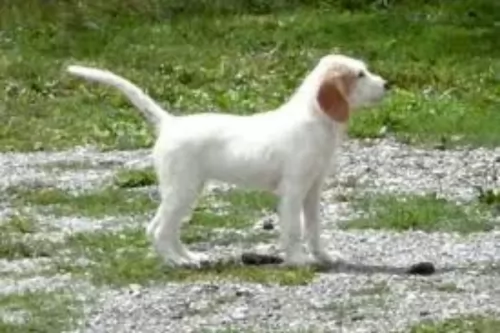 Medium in size, the Istarski Ostrodlaki Gonic stands at roughly 43 to 60cm at the withers and weighs roughly 12 to 27kg. The chest of the dog is broad and deep, the skull slightly rounded while the muzzle is strong and rectangular shaped. The nose is dark brown or black.
Medium in size, the Istarski Ostrodlaki Gonic stands at roughly 43 to 60cm at the withers and weighs roughly 12 to 27kg. The chest of the dog is broad and deep, the skull slightly rounded while the muzzle is strong and rectangular shaped. The nose is dark brown or black.
The ears are floppy and are nearly always in the orange color while the tail is long and is carried low. The coat of the rough haired dog is of medium length. In fact the coat can either be short and smooth or longish and wiry with a woolly undercoat. The color of the coat is white with orange markings.
This breed of dog is sought after for his cheerful personality. He is loyal to his human family and is a social dog, loving to spend time around his family.
He is energetic, confident and strong-willed and this is why, as with most other dogs, he will benefit from training and socialization, as this makes him obedient and responsive to his owner. He is evenly tempered, being gentle and docile.
 The Welsh Terrier is a medium sized breed that is compact and sturdy. They had docked tails in the past, but the practice is now illegal in the U.K. The dog is about as long as it is tall. The head and face are elongated with a beard and whiskers. Females are smaller than males, but both are compact and sturdy.
The Welsh Terrier is a medium sized breed that is compact and sturdy. They had docked tails in the past, but the practice is now illegal in the U.K. The dog is about as long as it is tall. The head and face are elongated with a beard and whiskers. Females are smaller than males, but both are compact and sturdy.
Eyes are almond shaped, dark brown and small. The ears are small and V shaped. They should not be thin. The muzzle is square and strong with a black nose. The lips are tight and they are also black.
They have a double coat with is rugged and wiry on top and the undercoat is insulative and softer. The coat is waterproof and protects from wind and dirt as well. The puppies are all black until about 9 months when they become black and tan. The legs, head and underbelly are tan, with a black saddle.
The Welsh Terrier has wiry hair on the legs, muzzle and quarters. The hair is very dense in the top coat. Their gait and movement is straight, effortless and free.
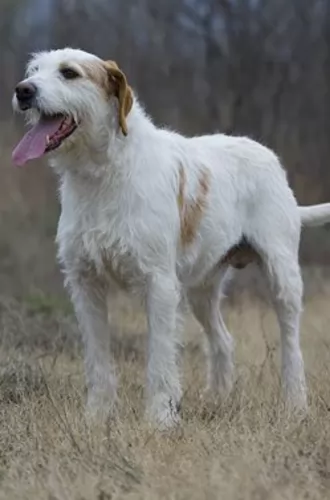 The Istrian Wire-haired Scenthound or Istarski Ostrodlaki Gonic as he is also referred to is a strong, well built hound which is elegant in appearance.
The Istrian Wire-haired Scenthound or Istarski Ostrodlaki Gonic as he is also referred to is a strong, well built hound which is elegant in appearance.
He has a remarkably striking coat - bright white with orange markings. He has always been an excellent hunting dog, even to this day. This background hunting of his will require that he receives ongoing exercise as well as mental stimulation.
Treat this beautiful dog well - exercise him, groom him, feed him well and love him and you will be rewarded with the loyal and devoted friendship of an amazing dog.
 1Children friendliness – The Welsh Terrier is good with kids and will follow them anywhere. They do want to play with the children by tugging on them and could cause a young child to fall. They can learn to play gently with small children.
1Children friendliness – The Welsh Terrier is good with kids and will follow them anywhere. They do want to play with the children by tugging on them and could cause a young child to fall. They can learn to play gently with small children.
3.Adaptability – They do fine in smaller indoor spaces as long as they have a robust exercise routine daily. They will be active indoors.
4.Learning ability -They are very smart, independent thinkers as can been seen by their ability to learn to play gently with small children. They need plenty of socialization early in life
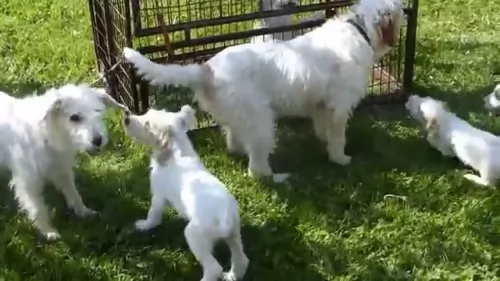 There are people who don’t take dental disease seriously in dogs as they think that it simply affects the teeth, when in fact dental disease can affect the dog’s entire body.
There are people who don’t take dental disease seriously in dogs as they think that it simply affects the teeth, when in fact dental disease can affect the dog’s entire body.
Dental- and gum disease is to be regarded with concern as it can be painful and even life threatening. It affects many dogs, and unfortunately your Istarski is also likely to have problems with his teeth. Tartar build-up and infection of the gums can lead to tooth loss but also damage to the kidneys, heart and joints.
Dogs need to have their teeth attended to regularly and if this is something new to you, speak to your vet and find out about special canine toothpaste and toothbrush and how to use them.
Dogs can be susceptible to bacterial and viral infections such as rabies, distemper and parvo, and that is why visits to your vet are so important. These life-threatening diseases for your Istarski Ostrodlaki Gonic are preventable through vaccinations.
 The Welsh Terrier is a fairly healthy hunting dog, though they do have some health issues.
The Welsh Terrier is a fairly healthy hunting dog, though they do have some health issues.
• Onychodystrophy – Nails grow weak and are very brittle. They can break easily and cause pain, irritation and even infections.
• Primary lens luxation – causes secondary glaucoma which can cause blindness.
• If hunting, they are exposed to hunting injuries and should be checked over well after a field adventure, whether hunting or in field trials.
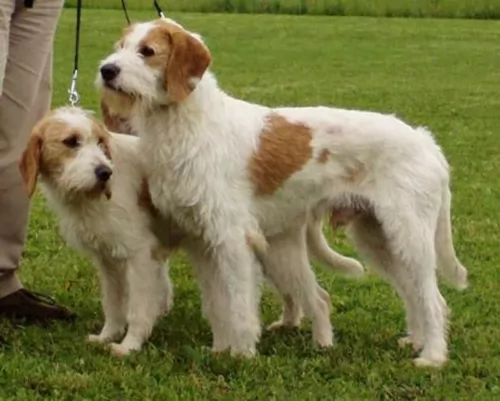 Taking care of an Istarski Ostrodlaki Gonic dog is much like caring for a child – doing everything you can to keep him healthy and happy, after all, he is a member of your family.
Taking care of an Istarski Ostrodlaki Gonic dog is much like caring for a child – doing everything you can to keep him healthy and happy, after all, he is a member of your family.
You want to be watching his diet and making sure that it is the best quality there is, full of vitamins and minerals to keep his eyes bright, his nose wet and his tail wagging.
There are excellent commercially manufactured dog foods on the market today and the best ones ensure excellent nutrition for your dog to keep him in optimal condition through each stage that he goes through. Try to include some home-made food into this kibble such as cooked chicken, brown rice and vegetables and it can be to his benefit to just to include some raw meat from time to time.
Make sure your Istarski Ostrodlaki Gonic is well exercised, that you check his teeth and ears to ensure there are no infections and to call the vet immediately you suspect something is wrong. Make sure you have him examined as a puppy and that he gets his necessary injections as there are diseases that can kill your dog.
 1.Feeding the puppy – the breed is prone towards obesity so do not overfeed wither the puppy or the adult. Watch the calorie level and make sure they get high quality, high protein feed meant for the breed or for medium sized dogs. Feed the puppies small amount 3-4 times per day.
1.Feeding the puppy – the breed is prone towards obesity so do not overfeed wither the puppy or the adult. Watch the calorie level and make sure they get high quality, high protein feed meant for the breed or for medium sized dogs. Feed the puppies small amount 3-4 times per day.
2.Feeding the adult - the breed is prone towards obesity so do not overfeed wither the puppy or the adult. Watch the calorie level and make sure they get high quality, high protein feed meant for the breed or for medium sized dogs. Feed the adult at least 2 times per day.
4. Games and Exercises Full of energy and requiring a routine outlet for that energy, the Welsh Terrier is an active dog. Just running around a fenced yard all day will not be enough physical and mental stimulation for them. If bored they can get into trouble. They need a job or a challenge. They love to swim and they love to chase. They do well in agility, field trials and barnhunt.